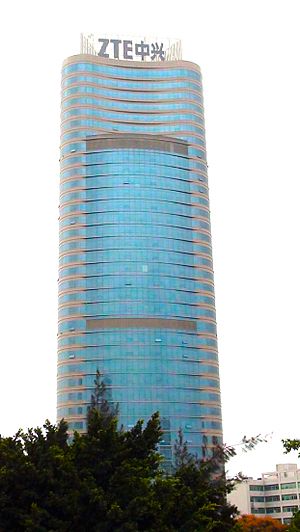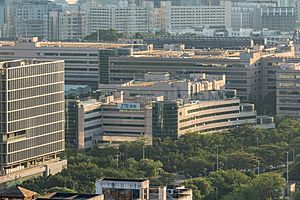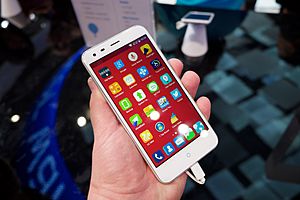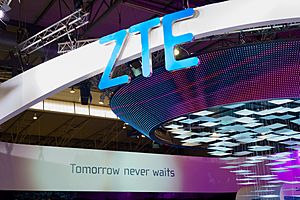ZTE facts for kids
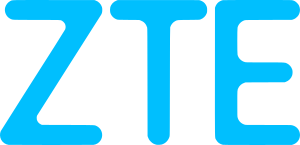 |
|
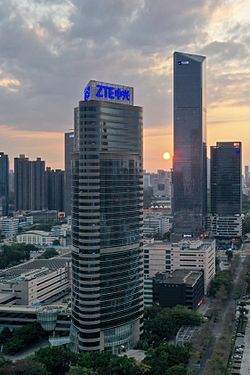
ZTE building in Hi-tech Zone of Nanshan District, Shenzhen, Guangdong
|
|
|
Formerly
|
Zhongxing Telecommunication Equipment Corporation |
|---|---|
| Public; state-owned enterprise | |
| Traded as | SZSE: 000063 SEHK: 763 |
| ISIN |
|
| Industry | Telecommunications equipment Networking equipment |
| Founded | 1985 (as Zhongxing Semiconductor Co., Ltd.) |
| Founder | Hou Weigui (Chinese: 侯為貴; pinyin: Hóu Wéiguì) |
| Headquarters | 55 Hi-tech Road South Shenzhen, Guangdong, China 518057 |
|
Area served
|
Worldwide |
|
Key people
|
Yin Yimin (Chairman) Zhao Xianming (President and Executive Director) |
| Products | Mobile phones, smartphones, tablet computers, hardware, software and services to telecommunications service providers and enterprises |
| Revenue | |
|
Operating income
|
|
| Total assets | |
| Total equity | |
| Owner | Zhongxingxin (30.34%); China Aerospace Science and Industry Corporation |
|
Number of employees
|
72,580 (2022) |
| Subsidiaries | Nubia Technology (49.9%) ZTEsoft Zonergy |
| Footnotes / references In consolidated financial statement; shareholders' equity figure are excluding perpetual capital instrument |
|
| ZTE Corporation | |||||||||||
|---|---|---|---|---|---|---|---|---|---|---|---|
| Simplified Chinese | 中兴通讯股份有限公司 | ||||||||||
| Traditional Chinese | 中興通訊股份有限公司 | ||||||||||
| Literal meaning | China-Prosperity Communications Company Limited by Shares | ||||||||||
|
|||||||||||
| Alternative Chinese name | |||||||||||
| Simplified Chinese | 中兴通讯 | ||||||||||
| Traditional Chinese | 中興通訊 | ||||||||||
| Literal meaning | China-Prosperity Communications | ||||||||||
|
|||||||||||
| Second alternative Chinese name | |||||||||||
| Simplified Chinese | 中兴 | ||||||||||
| Traditional Chinese | 中興 | ||||||||||
| Literal meaning | China-Prosperity [or the word itself: resurgence] | ||||||||||
|
|||||||||||
ZTE Corporation is a big Chinese technology company. It makes equipment for telecommunication, which means it helps people talk and connect using phones and the internet. The company started in 1985. You can buy shares of ZTE on the stock markets in Hong Kong and Shenzhen Stock Exchange.
ZTE's main work involves making things for wireless networks, phone systems, and fiber optic cables. They also create software for telecommunications and produce mobile phones. ZTE mostly sells products under its own name. However, they also make parts or products for other companies to sell under their brand.
Some countries, like the United States, have had concerns about ZTE's connections to the Chinese government. These concerns are about whether the equipment could be used for spying. In 2017, ZTE had to pay a large fine for sending U.S. technology to countries like Iran and North Korea, which was against the rules. Later, in 2018, the U.S. stopped its companies from selling parts to ZTE for a while. This ban was lifted after ZTE changed its leaders and agreed to new rules. In 2020, the U.S. government called ZTE a risk to national security.
Contents
The Story of ZTE
ZTE first started in 1985 in Shenzhen, Guangdong province, China. It was first called Zhongxing Semiconductor Co., Ltd. A group of investors linked to China's Ministry of Aerospace Industry helped start it. In 1993, the company changed its name to Zhongxing New Telecommunications Equipment Co., Ltd. It became a new kind of company, partly owned by the state but run like a private business.
ZTE first offered its shares to the public on the Shenzhen stock exchange in 1997. Then, in 2004, it did the same on the Hong Kong Stock Exchange. The money from selling shares helped ZTE grow. They used it to develop new technologies and sell their products in more countries.
By 2006, ZTE was doing very well in the international market. They got 40% of all new orders for CDMA networks around the world. This made them the top company for CDMA equipment that year. Also in 2006, a Canadian company called Telus became a customer. ZTE also joined the Wi-Fi Alliance, a group that promotes Wi-Fi technology.
By 2009, ZTE was the third-largest seller of GSM telecom equipment globally. About 20% of all GSM gear sold worldwide that year was from ZTE. By 2011, the company owned about 7% of the patents for LTE technology. LTE is a fast wireless technology used in many mobile phones.
What Happened with U.S. Rules?
In March 2017, ZTE admitted to breaking rules by sending U.S. technology to Iran and North Korea. These actions went against trade rules. The U.S. Department of Commerce fined ZTE about US$1.19 billion. This was the biggest fine ever for breaking export rules.
ZTE was allowed to keep working with U.S. companies. But they had to make sure to punish the employees who were involved in breaking the rules. However, the U.S. Department of Commerce found that ZTE had not fully followed these terms. They had only fired a few senior officials and still gave bonuses to many other employees involved.
So, on April 16, 2018, the U.S. Department of Commerce stopped U.S. companies from selling anything to ZTE for seven years. This was a big problem for ZTE because many of its smartphone parts came from the U.S. For example, Qualcomm processors and Android software with Google Mobile Services were U.S.-made. Experts said it would be very hard for ZTE to make its products without U.S. parts.
On May 9, 2018, ZTE announced that it had stopped most of its main activities, like making products. They also stopped trading their shares. This was because of the U.S. ban. On May 13, 2018, U.S. President Donald Trump said he would work with Chinese President Xi Jinping to lift the ban. Some people thought the ban was being used to help in a trade disagreement with China.
On June 7, 2018, ZTE agreed to a deal with the Department of Commerce to lift the ban. ZTE agreed to pay another US$1 billion fine. They also had to put US$400 million in a special account. ZTE also agreed to replace all of its top leaders and create a new team to make sure they follow the rules for 10 years.
Later that month, the U.S. Senate tried to block this deal. They also wanted to stop the U.S. government from buying equipment from Huawei and ZTE. This was because of concerns about national security and possible spying by the Chinese government. However, the House of Representatives passed a different version of the bill. This version did not block the deal but still stopped the federal government from buying Huawei and ZTE products.
On July 13, 2018, the ban on ZTE was officially lifted.
In June 2020, the Federal Communications Commission (FCC) in the U.S. said ZTE was a threat to U.S. communication networks. In July 2020, the U.S. government stopped companies that use ZTE from getting federal contracts. The FCC confirmed its decision in November 2020.
In December 2020, the U.S. Congress set aside money to help phone companies in rural areas remove ZTE equipment. In November 2022, the FCC officially banned the sale or import of ZTE equipment in the U.S. for national security reasons.
Who Owns ZTE?
As of June 30, 2019, a company called Zhongxing Xin (also known as ZTE Holdings) owned 27.40% of ZTE.
ZTE Holdings itself has several owners. These include Xi'an Microelectronics and Aerospace Guangyu, which are both owned by the Chinese government. Another owner is Zhongxing WXT, which is owned by the people who founded ZTE, like Hou Weigui. There is also a private investment fund called Guoxing Ruike.
Because of these different owners, ZTE is seen as a mix. It's partly owned by the government but run like a private company. Both the South China Morning Post and the Financial Times have described ZTE as state-owned. Some experts have also pointed out links between ZTE's state-owned owners and the People's Liberation Army.
ZTE's Other Companies
ZTE has many smaller companies (subsidiaries) in different countries. These include places like Indonesia, Australia, Germany, the United States, India, and Brazil.
One of its subsidiaries is ZTEsoft. This company works in the information and communication technology (ICT) industry. It provides software and services to phone companies and also helps businesses and governments with things like smart city projects.
Nubia Technology used to be fully owned by ZTE. But ZTE has since sold most of its shares in Nubia. By 2017, ZTE owned 49.9% of Nubia.
Zonergy is a company that focuses on renewable energy. It builds solar power plants in China and Pakistan. It also grows palm oil in Indonesia to make biofuels. ZTE is a major shareholder in Zonergy and helped create the company in 2007. However, ZTE owns a smaller part of Zonergy now.
In 2016, ZTE agreed to buy a 48% share in a Turkish company called Netaş Telekomünikasyon A.Ş. for $101.3 million. After this deal in 2017, ZTE became the biggest shareholder in Netaş. Netaş still operates as its own company.
What Products Does ZTE Make?
ZTE works in three main areas:
- Carrier networks: This means making equipment for big phone companies to build their networks.
- Government and corporate business: This involves providing technology and services to governments and other businesses.
- Consumer business: This is about making products for everyday people, like mobile phones.
In 2010, a special security part of ZTE's products received a U.S./Canada FIPS140-2 security certification. This means it met high security standards.
ZTE was also reported to have created identification cards for Venezuela. These cards were said to be used for tracking people and social control.
Who Are ZTE's Customers?
In the 2000s, most of ZTE's customers were phone companies in developing countries. But now, ZTE products are also used in developed countries. For example, Vodafone in the UK, Telus and Fido in Canada, Telstra in Australia, and France Telecom have all bought equipment from ZTE.
Many Chinese companies are also ZTE customers. These include big names like China Mobile and China Telecom.
ZTE started selling smartphones in the United States in 2011. The company decided to focus on making affordable phones for discount and prepaid phone plans. These phones often included cool features usually found in more expensive phones, like large screens and fingerprint readers.
Sports Sponsorships
ZTE also sponsors sports teams!
In May 2016, ZTE became a co-sponsor for the German football club Borussia Mönchengladbach.
Since 2015, ZTE has also sponsored several U.S. National Basketball Association (NBA) teams. These include famous teams like the Houston Rockets, Golden State Warriors, and New York Knicks.
Images for kids
See also
 In Spanish: ZTE para niños
In Spanish: ZTE para niños
 | Emma Amos |
 | Edward Mitchell Bannister |
 | Larry D. Alexander |
 | Ernie Barnes |



